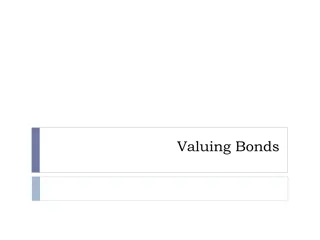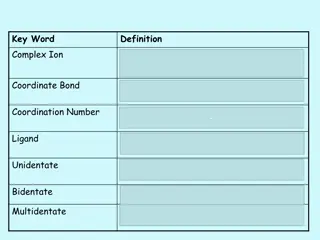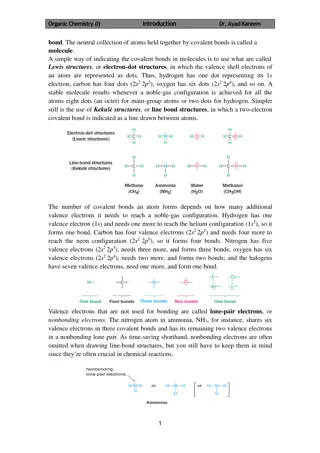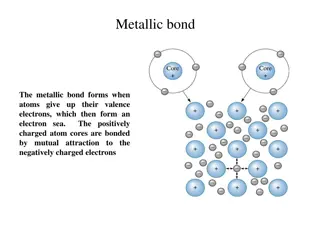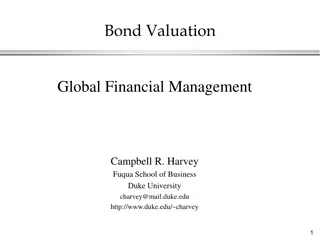Understanding Surety Bonds: Importance, Issues, and Solutions
Surety bonds are essential contracts providing security and assurance, but common failures include lack of trust, knowledge, and capacity appreciation. Despite challenges in the industry, the reasons to persevere include growth potential and manageable processes. Problems such as poor risk assessment and competition require attention to prevent capital exposure and ensure smooth claims settlement protocols.
Download Presentation

Please find below an Image/Link to download the presentation.
The content on the website is provided AS IS for your information and personal use only. It may not be sold, licensed, or shared on other websites without obtaining consent from the author. Download presentation by click this link. If you encounter any issues during the download, it is possible that the publisher has removed the file from their server.
E N D
Presentation Transcript
BONDS SHOULD WE OR SHOULD WE NOT BONDS are SURETY CONTRACTS They offer SECURITY, ASSURANCE, CERTAINTY, A PLEDGE etc
Founded or premised on KNOWLEDGE OR APPRECIATION OF CAPACITY, CAPABILITY TO PERFORM
SURETYSHIP is therefore the relationship between the Surety, the Principal Debtor and the Creditor. Unlike Insurance Contracts, there are invariably three parties.
OUR FAILURES Lack of appreciation that suretyship contracts are premised on:- TRUST KNOWLEDGE CAPACITY PERFORMANCE (PRIOR)
SHOULD WE OR SHOULD WE NOT We definitely should!
THE REASONS WE SHOULD NOT GIVE UP ARE:- It is one of the fastest growing line of business and income (Premium/commission) is good! Demand would continue a northward growth as the Ghanaian economy also grow The Process (ie acceptance protocol) can be better managed than we are doing now The expensive cycle has matured
WHAT ARE THE PROBLEMS/BOTTLENECKS THE CLAIMS SETTLEMENT PROTOCOL POOR ASSESSMENT OF RISK OTHERS CONTRACT WORDING appreciation of risk Strict Liability No defined basis Competition (especially for demand bonds) Weak assessment protocol No conditional provisions claims of fraud as basis for repudiation (terms and conditions) enforcement Assumption of counter No exclusions Capacity of staff lack of regulatory guarantees Failure to follow No endorsement processes and procedures no penalties Breakdown of supervision
RESULTS Huge claims/ Interest Litigation (and related cost) Exposure of Capital Erratic Response to Issues
TYPICAL BOND WORDING (BOND/COUNTER GUARANTEE) We .. Insurance Co. Ltd. guarantee to pay (BANK), upon your FIRST DEMAND and WITHOUT CAVIL OR ARGUMENT, any sum or sums up to the limit of .. (amount) including interests, commissions and charges as aforesaid without your needing to prove or to show grounds or reasons for your demand for the sum specified therein and despite any objection by the Customer.
The total liability of the GUARANTOR under this Guarantee shall under no circumstances exceed the said sum of amount .. (amount) inclusive of interest, bank charges and commissions should . (contractor) fail to fulfil its obligation under the Bank Guarantee.
BINDING CLAUSE FOR COUNTER GUARANTEE CLAUSE The wording for a Counter Guarantee is as follows:-
The Contractor has undertaken in pursuance of a Contract to DESIGN AND BUILD .. (hereinafter called the contract ) for Co Ltd. (hereinafter called the Principal ) The Principal has requested the Contractor to provide an Advance Payment Guarantee (hereinafter called the Facility ) to guarantee proper and loyal performance of the contract.
The Beneficiary has agreed to provide the Facility, in the amount of . Subject to the Contractor obtaining a Counter Guarantee from an Insurance Company for the said (amount) as security for compliance with the Contractor s performance obligations in accordance with the Contract. The Insurance Company has agreed to give the Contractor such a Counter Guarantee
NOW THEREFORE WE . Hereby affirm that we are the Insurance Company and responsible to you on behalf of the Contractor, up to a total amount of such sum being payable in the types and proportions of currencies in which the Contract Price is payable, and we undertake to pay you, upon first demand and without cavil or argument, any sum or sums within the limits of . As aforesaid without needing to prove or to show grounds or reason for your demand for the sum specified therein and despite any objection by the Contractor.
The following are noted:- Payment is upon first demand by the Principal There is no recourse to recompense from the Guaranteed prior to settlement. The most important words are upon first demand and without cavil or argument .
The word cavil is defined by the Websters Encyclopedic Unabridged Dictionary as to raise irritating and trivial objections or to oppose by inconsequential, frivolous or sham objections .
NOTE:- The major problems are with FINANCIAL/CREDIT/SUPPLIER GUARANTEES CONSTRUCTION BONDS/ GUARANTEES are relatively safe (Refer to cases in the courts) - ITAL - NDK
TO ADDRESS THE PROBLEMS:- OPERATIONAL/TECHNICAL DEFECIENCIES NEED TO BE ADDRESSED Wordings strict acceptance protocols Involvement -(demand contracts) - Protocols of Counter (Actual monitoring) -fault based wordings Guarantees - ICC wordings -Sanction - Involvement of professional bodies
REGULATIONS No clear regulatory framework Regulations should cover:- Capital/Acceptance Reinsurance Sanctions
WORDINGS International Chamber of Commerce Uniform Rules for Demand Guarantees (URDG) - These reflect International standard practise in the use of Demand Guarantees - They balance the legitimate interest of all parties. - URDG 758 - URDG 357
FIDIC RULES Note:- Nothing really prevents anyone from introducing terms / conditions into Surety Contracts. However, introducing wordings that negates the essence of surety contracts are unacceptable especially where that is done on the blind side of the Principal (Beneficiary)
Change Brokers Guarantors (Sureties)



